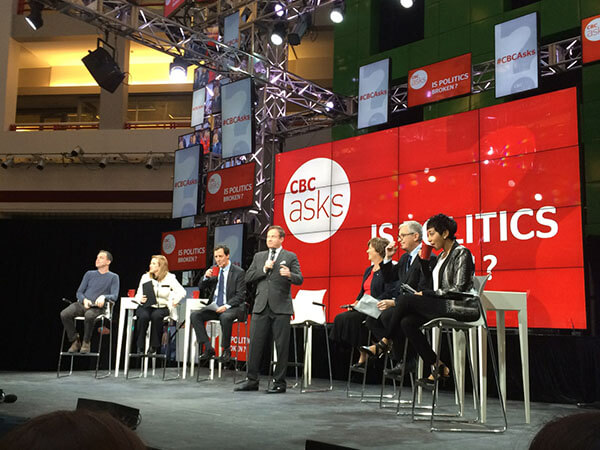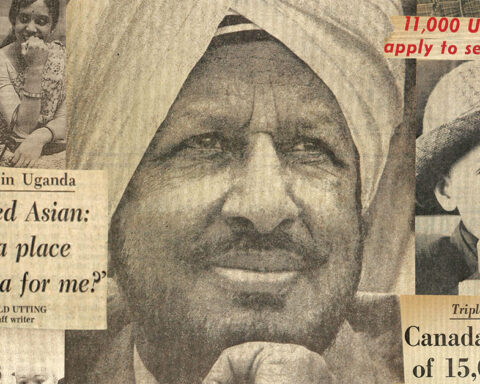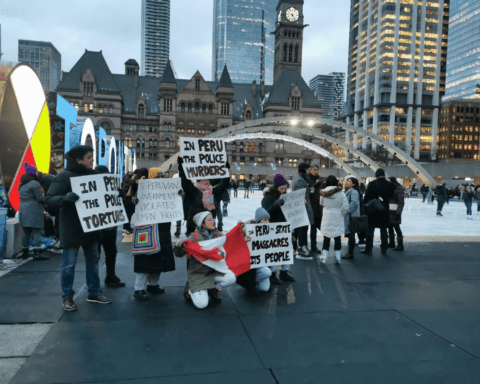Is politics ‘broken’? For a growing number of Canadians, the answer appears to be ‘yes’ – and there may not be an easy fix.
The CBC posed this question during its inaugural ‘CBC Asks’ public debate, live-streamed from the atrium of the corporation’s Toronto headquarters this week. An audience of approximately 300 people, and countless more online, watched as two teams each made their case. The debaters tried to sway the vote, and convince viewers that the political process either continues (or ceases) to be the most effective way to enact real change, both in Canada and globally.
The debate dovetailed with the release of Samara Canada’s first-ever “Democracy 360” – a report card measuring the health of Canada’s democracy. Samara Canada is a charity that tries to enhance civic engagement without being affiliated with any one political party. The report card focuses on public opinion of political leaders and their politics. It’s designed to prompt reflection and discussion, particularly in light of 2015 being a federal election year.
Canada’s Grade
How’d Canada fare? Well, we got a ‘C’, with the comment that “our democracy is not doing as well as a country as rich as Canada deserves.”
Samara’s co-founder Alison Loat insists that the country’s political system now repels more people than it attracts, particularly young people.
“We spend hundreds of millions of dollars helping immigrants build lives here and spend next to none of that money introducing them constructively to our democratic system.” – Alison Loat, Samara Canada
“About 40 per cent of Canadians say they don’t trust their elected leaders, our political parties, and believe they largely fail to perform their jobs,” says Loat. More Canadians are finding politics to be “irrelevant”, she says, and there is little being done to empower newcomers to be active participants in the political process.
“We spend hundreds of millions of dollars helping immigrants build lives here and spend next to none of that money introducing them constructively to our democratic system,” adds Loat.
Her teammate, political columnist Andrew Coyne, agrees.
“If you’re well-heeled, well-funded, or well-connected, no doubt, politics works for [you],” he says.
A video snapshot, shown prior to the debate, polled Canadians and asked them to share their insights on politics.
“If there were more naturalized citizens that were in power, that would represent us on all levels of government, that would be better, because right now, the politicians don’t really look like the immigrants – or the average Canadian,” says one woman. “If I don’t vote, then I won’t have exercised my right as a citizen.”
The Right to Vote
CBC chief correspondent, Peter Mansbridge, moderated the debate, and pointed out that citizens in some countries are denied a basic right – one that so many in North America choose to forfeit.
“I think for a lot of us in this room, we’ve either been in countries, or we’ve seen television reports from countries, where we’ve seen, on voting day, people lined up for blocks, some of them crying. Why? Because they suddenly have the right to vote,” says Mansbridge.
“They’ve fought for that right. They’ve watched people die for that right. In some cases, some people are still dying for that right to vote.”
“We can’t afford to just sit on the sidelines and be cynical, because it’s actually through the friction of political debate that we get big, bold policy ideas.” – Aisha Moodie-Mills
A stark comparison from the scene in this country, where voting turnout rates have dropped significantly. During Canada’s last federal election, voter turnout was a reported 61 per cent, a marginal increase from the year before. However it still meant approximately 40 per cent of Canadians eligible to vote chose not to.
“How well is politics working when the parliament we elect looks nothing like the parliament we voted for?” asks Coyne. “When 38 per cent of the vote gives you 60 per cent of the seats and 100 per cent of the power?”
“In the last Canadian election, the vast majority of Canadians voted against the incumbent government,” says Dave Meslin, Coyne’s fellow teammate and someone the National Speakers Bureau deems a “community catalyst”.
“In most Western democracies, when a party takes power against the will of the majority, it’s called a coup – and it’s a bad thing. Here, we call it an election and we publicly finance the whole thing.” – Dave Meslin
Meslin’s comments were met with applause and cheers from the audience as he underscored the need to implement ‘proportional representation’. He cites the First Past the Post voting system adopted in Canada and the U.S., which he says prevents citizens from fairly electing representatives. More importantly, Meslin says the desires of the people don’t translate into seats in the government.
“In most Western democracies, when a party takes power against the will of the majority, it’s called a coup – and it’s a bad thing. Here, we call it an election and we publicly finance the whole thing,”he says, to peals of laughter from the crowd.
 No Room for Cynicism
No Room for Cynicism
The verbal sparring, albeit entertaining, by the two teams (pictured to the right), was effective in highlighting the strengths and weaknesses of the political arena. The debate continued with the opposing team, who admitted that though the political process has its fair share of imperfections, it’s still a tool worth keeping and should not be undermined. The team threw the question back to their opponents, asking: how would society function better without the current democratic process?
“Why would you leave the running of the country to people you don’t trust, when it’s completely within your hands to go about and have your say?” – Monte Solberg
“We can’t afford to just sit on the sidelines and be cynical, because it’s actually through the friction of political debate that we get big, bold policy ideas,” says U.S. political strategist, Aisha Moodie-Mills. “It’s those policy ideas that then become laws, and it’s the laws that strengthen and safeguard and secure our society and our day-to-day lives.”
“Why would you leave the running of the country to people you don’t trust, when it’s completely within your hands to go about and have your say?” asks Moodie-Mills’ teammate, former Conservative MP Monte Solberg. “Canadian voters are not victims. The ability to create change is in your hands.”
Rounding up Solberg’s team was another parliamentary alumnus – former Liberal MP Sheila Copps, who reinforced that the only place real change can happen is in politics.
What must happen now is a radical culture shift to empower citizens and make them feel politics can be used as a tool in the country to bring about change.
“We are now in the most racially diverse city in the world, and people get along, and there are lots of other places in the world where that is not happening,” says Copps, who asserts it couldn’t have happened without the decision of multiple governments. She cites the Canadian Multiculturalism Act of 1970, as just one piece of legislation that governed how we would learn to live together.
“We asked the CRTC to implement laws to see ourselves reflected on the airwaves. It didn’t happen by accident,” says Copps. “The reason we have been successful in Canada is not because we’re better than other places around the world, but we put in place laws to guarantee that the minority have equal rights with the majority.”
 Turning Things Around
Turning Things Around
Samara Canada insists it will take more than just higher voter turnout. What must happen now is a radical culture shift to empower citizens and make them feel politics can be used as a tool in the country to bring about change. It doesn’t end there – politicians need to be vibrant and reliable, whereas citizens need to begin to get engaged by first starting to talk about politics and eventually getting more involved in the democratic process – not simply just by casting their ballots every election.
At the beginning of the debate, the audience electronically cast its ballots (using device pictured to the left), revealing 69 per cent did not feel the political process was worthwhile.
By the end of the debate, after everyone had spoken – including two former parliamentarians – that number had risen to 76 per cent – a 7 per cent increase.
That in itself was the testament of the power of sway, underscoring the disconnect between politicians and citizens, and the growing apathy and disenchantment that now pervades the Canadian social consciousness.




